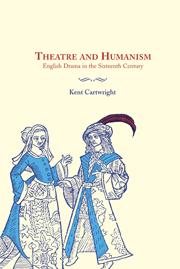Book contents
- Frontmatter
- Contents
- Acknowledgments
- Introduction
- 1 The humanism of acting: John Heywood's The Foure PP
- 2 Wit and Science and the dramaturgy of learning
- 3 Playing against type: Gammer Gurton's Needle
- 4 Time, tyranny, and suspense in political drama of the 1560s
- 5 Humanism and the dramatizing of women
- 6 The confusions of Gallathea: John Lyly as popular dramatist
- 7 Bearing witness to Tamburlaine, Part 1
- 8 Robert Green's Friar Bacon and Friar Bungay: the commonwealth of the present moment
- Afterword
- Notes
- Index
2 - Wit and Science and the dramaturgy of learning
Published online by Cambridge University Press: 22 September 2009
- Frontmatter
- Contents
- Acknowledgments
- Introduction
- 1 The humanism of acting: John Heywood's The Foure PP
- 2 Wit and Science and the dramaturgy of learning
- 3 Playing against type: Gammer Gurton's Needle
- 4 Time, tyranny, and suspense in political drama of the 1560s
- 5 Humanism and the dramatizing of women
- 6 The confusions of Gallathea: John Lyly as popular dramatist
- 7 Bearing witness to Tamburlaine, Part 1
- 8 Robert Green's Friar Bacon and Friar Bungay: the commonwealth of the present moment
- Afterword
- Notes
- Index
Summary
In the early sixteenth century, humanist pedagogues discovered in drama a useful vehicle to promote their educational ideals. While print helped humanist reformers to stimulate controversy and public interest, drama served well for countering resistance to humanist education and for shaping students to humanist values. Plays, of course, were widely read and performed in schools in England and across Renaissance Europe: Terence and Plautus were translated and morally explicated, and play-acting offered students practice in language, oratory, gesticulation, public presentation, and even boldness and discretion. Mid-century statutes at Eton, for example, memorialize the practice of teaching oratory and gesture through dramatic presentation, and Richard Mulcaster's Merchant Taylor's School in the 1570s and 1580s was remembered for instilling ‘“good behaviour and audacitye”’ through acting. Besides being heuristic, school theatre revealed itself as apt for promoting the humanist educational vision. That vision shapes John Redford's Wit and Science (c. 1530–47), and learning as a theme permeates numerous other plays, such as Henry Medwall's Nature (c. 1495), Youth (c. 1513), John Rastell's The Nature of the Four Elements (c. 1518), John Skelton's Magnificence (1519), Nice Wanton (1547–53), Lusty Juventus (c. 1550), Thomas Ingelend's The Disobedient Child (c. 1560), William Wager's The Longer Thou Livest the More Fool Thou Art (c. 1568), and Misogonus (c. 1570). What about early drama makes it so appealing to humanist learning?
For humanist reformers, drama promised to encourage the spectators' emotional embrace of the transformative vision of education through their engagement with the protagonist's self-discovery.
- Type
- Chapter
- Information
- Theatre and HumanismEnglish Drama in the Sixteenth Century, pp. 49 - 74Publisher: Cambridge University PressPrint publication year: 1999



